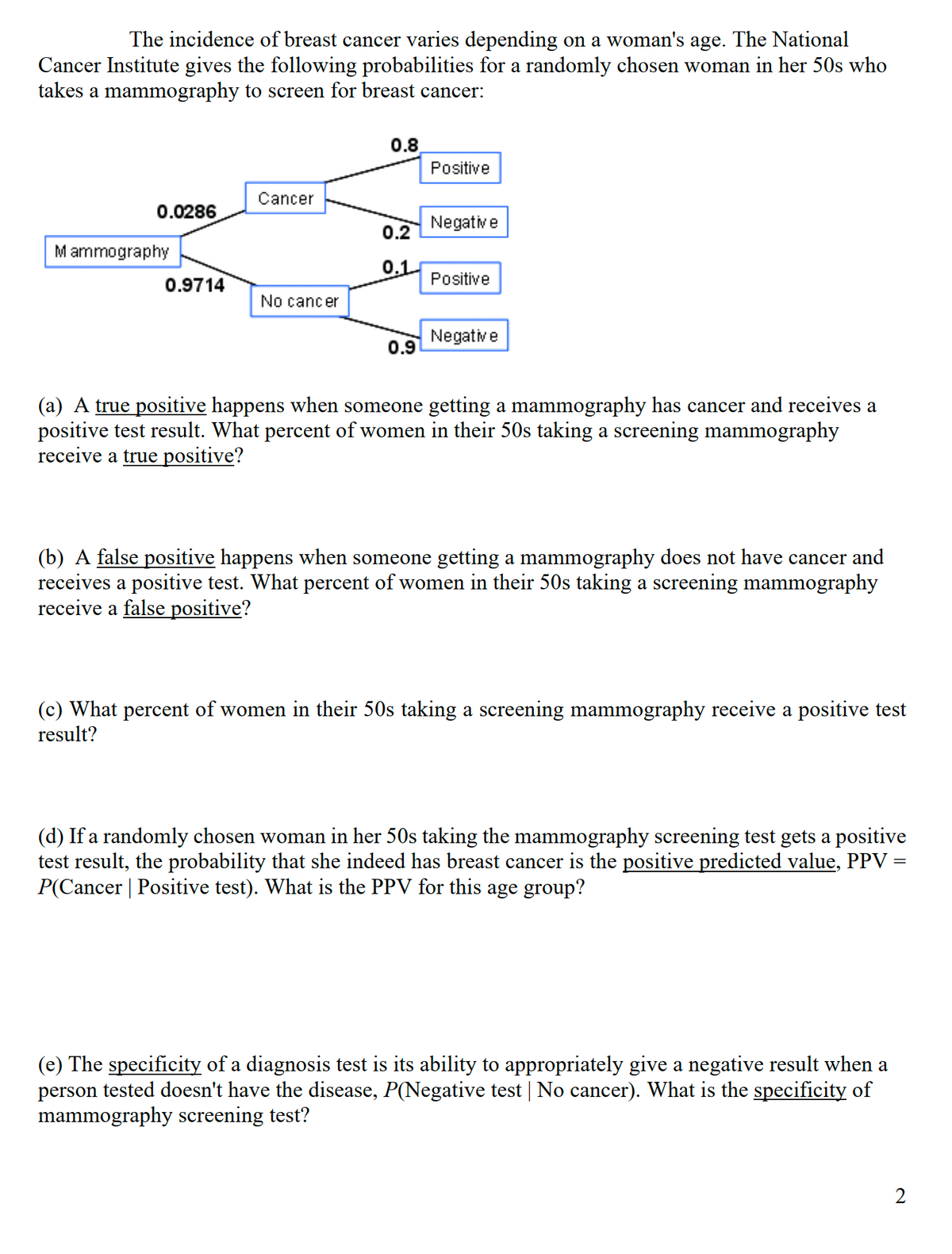The incidence of breast cancer varies depending on a woman's age. The National Cancer Institute gives the following probabilities for a randomly chosen woman in her 50s who takes a mammography to screen for breast cancer: 0.8 Positive Cancer 0.0286 Negative 0.2 M ammography 0.1 Positive 0.9714 No cancer Negative 0.9 (a) A true positive happens when someone getting a mammography has cancer and receives a positive test result. What percent of women in their 50s taking a screening mammography receive a true positive? (b) A false positive happens when someone getting a mammography does not have cancer and receives a positive test. What percent of women in their 50s taking a screening mammography receive a false positive? (c) What percent of women in their 50s taking a screening mammography receive a positive test result?
The incidence of breast cancer varies depending on a woman's age. The National Cancer Institute gives the following probabilities for a randomly chosen woman in her 50s who takes a mammography to screen for breast cancer: 0.8 Positive Cancer 0.0286 Negative 0.2 M ammography 0.1 Positive 0.9714 No cancer Negative 0.9 (a) A true positive happens when someone getting a mammography has cancer and receives a positive test result. What percent of women in their 50s taking a screening mammography receive a true positive? (b) A false positive happens when someone getting a mammography does not have cancer and receives a positive test. What percent of women in their 50s taking a screening mammography receive a false positive? (c) What percent of women in their 50s taking a screening mammography receive a positive test result?
Chapter8: Sequences, Series,and Probability
Section8.7: Probability
Problem 11ECP: A manufacturer has determined that a machine averages one faulty unit for every 500 it produces....
Related questions
Concept explainers
Contingency Table
A contingency table can be defined as the visual representation of the relationship between two or more categorical variables that can be evaluated and registered. It is a categorical version of the scatterplot, which is used to investigate the linear relationship between two variables. A contingency table is indeed a type of frequency distribution table that displays two variables at the same time.
Binomial Distribution
Binomial is an algebraic expression of the sum or the difference of two terms. Before knowing about binomial distribution, we must know about the binomial theorem.
Topic Video
Question

Transcribed Image Text:The incidence of breast cancer varies depending on a woman's age. The National
Cancer Institute gives the following probabilities for a randomly chosen woman in her 50s who
takes a mammography to screen for breast cancer:
0.8
Positive
Cancer
0.0286
Negative
0.2
M ammography
0.1
0.9714
Positive
No cancer
Negative
0.9
(a) A true positive happens when someone getting a mammography has cancer and receives a
positive test result. What percent of women in their 50s taking a screening mammography
receive a true positive?
(b) A false positive happens when someone getting a mam
receives a positive test. What percent of women in their 50s taking a screening mammography
receive a false positive?
ammography does not have cancer and
(c) What percent of women in their 50s taking a screening mammography receive a positive test
result?
(d) If a randomly chosen woman in her 50s taking the mam
test result, the probability that she indeed has breast cancer is the positive predicted value, PPV =
P(Cancer | Positive test). What is the PPV for this age group?
ammography screening test gets a positive
%3D
(e) The specificity of a diagnosis test is its ability to appropriately give a negative result when a
person tested doesn't have the disease, P(Negative test | No cancer). What is the specificity of
mammography screening test?
2
Expert Solution
This question has been solved!
Explore an expertly crafted, step-by-step solution for a thorough understanding of key concepts.
This is a popular solution!
Trending now
This is a popular solution!
Step by step
Solved in 2 steps with 1 images

Knowledge Booster
Learn more about
Need a deep-dive on the concept behind this application? Look no further. Learn more about this topic, statistics and related others by exploring similar questions and additional content below.Recommended textbooks for you



